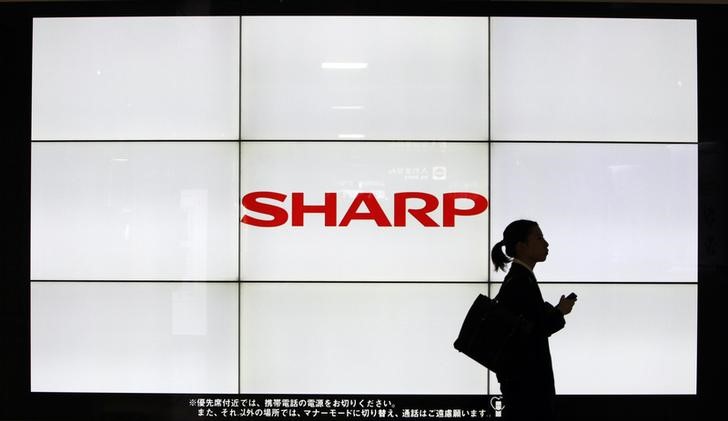By Ritsuko Ando
TOKYO (Reuters) - In an industry dominated by Apple Inc, Samsung Electronics Co and other Asian firms, the differing strategies used by Japan's technology firms to try to cope have led to losses for some and profits for others.
On Tuesday, Osaka-based Sharp Corp warned it will slip into its third annual net loss in four years, saying a supply glut squeezed sales of smartphone displays in China, the business line it had counted on for growth. Best known for the Aquos TV brand, it said it's now rethinking its businesses.
Reporting earnings across town, Panasonic Corp said it remains on track for its best annual operating profit since 2008, despite a third-quarter blip. The firm has sought to reinvent itself as a maker of high-tech parts for cars and energy-efficient homes, shifting away from smartphones and TVs.
Like Sony Corp, which reports third-quarter earnings on Wednesday, Sharp and Panasonic have been forced into restructuring their businesses in recent years after losing market share to Apple, Samsung and a raft of aggressive, cheaper Chinese manufacturers. In fiscal 2013 alone, Sharp and Panasonic combined piled up losses of about $11 billion (7 billion pounds).
"I believe it is my responsibility to compile a new business plan as soon as possible," Sharp Chief Executive Officer Kozo Takahashi told reporters at a briefing in Tokyo on Tuesday. Sharp will present a new business plan around May, he said.
Reporting it reversed into a net loss for the quarter ended December, Sharp said it expects to book a net loss of 30 billion yen ($256 million) this fiscal year through March, compared with the 30 billion net profit it previously forecast.
Analysts surveyed by Thomson Reuters had expected a full-year net profit of 22.4 billion yen, bolstered by increasing sales to Chinese smartphone makers like Xiaomi Technology Co Ltd (XTC.UL).
Takahashi said that in addition to pricing pressure, he was seeing a slowdown in smartphone sales in China that had left it with a supply glut that would take until the middle of the year to correct. "We're aware that this is an extremely serious situation."
The forecast loss will leave the company falling short an earlier pledge to its creditors to remain profitable this year - it also received a bailout in 2012 worth over $4 billion at the time from its banks. The loss doesn't mean it will immediately breach debt covenants, but will expose Takahashi and management to pressure to exit the loss cycle quickly - including by further restructuring.
Sharp had warned two weeks ago that it would likely miss its targets, without giving precise numbers. On Tuesday, its volatile shares rose 5.6 percent as investors hoped the worst may be over this year with a new business plan on the way. As of Monday's close, they were down around 33 percent from a year earlier.
By contrast, Panasonic reiterated its full-year operating profit forecast of 350 billion yen, raised from 310 billion yen on Oct. 31 last year. That would be up 15 percent compared with the previous fiscal year.
Third-quarter operating profit slipped 2.8 percent to 113.3 billion yen from a year earlier on weak sales in its increasingly sidelined TV business, but fell less than expected thanks to solid sales of automotive and industrial components.
